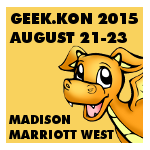
Many gamers I know started with Dungeons & Dragons. Shadowrun and Vampire: The Masquerade and Obsidian: The Age of Judgement were my (un)holy trilogy because those were the games I could connect with, the fans I could relate to. Ravenloft and All Flesh Must Be Eaten followed shortly afterward, too, but the games I strayed toward in the beginning were dark and edgy. Hell, I remember goths of all stripes owning the convention halls. Our black leather pants. Our satin shirts, shock red hair, and corsets. Our kick ass boots. Our heart-thumping, heart-twisting music. Our dice. Our game, the one where we f-bomb’ing owned the night. We were known, when we walked the hall, as Vampire players with a capital “V”.
Around the same time, I started applying to different companies to write for them, and opted to start out with small press publishers. I didn’t realize it at the time, but the reason why I didn’t try to write for White Wolf or Wizards back in the day, is because I internalized that I would never be able to. The gods of gaming, like Justin Achilli(1), were key word: gods. I connected with other fans, I was heavy into the lore (e.g. the novels, TV show, and Bloodlines) and progressed through other World of Darkness games and themes including Mummy, Wraith, etc. The LARP, not as much, because by the time I connected to the game in that way, there were established groups and I find that to be intimidating. But, I didn’t either recognize or realize that I could work on Vampire, because I perceived that door was closed.
My perception began to change, slowly but surely, as new writers were added. Namely, after meeting my friend Jess Hartley and falling in love with her work. As my relationships grew, slowly but steadily in the industry without the benefit of social media at the time, I took bigger chances. By that time, however, a new game had arrived called Vampire: The Requiem. Vampire: The Masquerade, the game I started with, fell into the category of “classic” for a time. And, while some of the same writers and designers still worked for White Wolf, in all its iterations, it was clear to me the company and its staff was evolving to add a diverse range of writers that matched its players and its fan base.
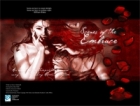 Eventually, as my portfolio grew, I did submit to White Wolf. I come from a literary background, as many of my readers know, so it should come as no surprise I submitted a Promethean: The Created short story for their then-magazine, the White Wolf Quarterly, which was published in…2006 if I’m remembering right. No, that isn’t Vampire, but that came out of my love for the game, because by then the new World of Darkness (which is now known as the Chronicles of Darkness) was the company’s primary focus. Eddy Webb gave me my first assignment, and I was very intimidated following in the footsteps of Will Hindmarch to design and write Scenes of the Embrace for Vampire: The Requiem.
Eventually, as my portfolio grew, I did submit to White Wolf. I come from a literary background, as many of my readers know, so it should come as no surprise I submitted a Promethean: The Created short story for their then-magazine, the White Wolf Quarterly, which was published in…2006 if I’m remembering right. No, that isn’t Vampire, but that came out of my love for the game, because by then the new World of Darkness (which is now known as the Chronicles of Darkness) was the company’s primary focus. Eddy Webb gave me my first assignment, and I was very intimidated following in the footsteps of Will Hindmarch to design and write Scenes of the Embrace for Vampire: The Requiem.
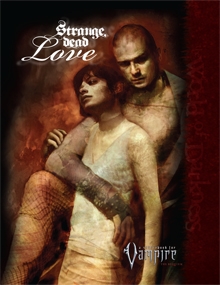 My first draft sucked, and I totally missed the mark. But, thanks to Eddy’s style of collaboration and development, I nailed the second draft. He understood that writing for White Wolf was new for me, but he also knew I was willing to do the work to make it right. It’s partly because of this experience that I give all of my writers the chance to suck on their first drafts, because without that I wouldn’t have been able to keep writing for the company. Then, developer Rose Bailey hired me (along with Jess Hartley and Filamena Hill) to write for Strange, Dead Love which tied neatly into what I learned through the RWA, my feelings on one of the origins of the Western European vampire myth (e.g. the dead, blood-drinking lovers returning from their graves), and the opinions I had on the paranormal romance genre in general.
My first draft sucked, and I totally missed the mark. But, thanks to Eddy’s style of collaboration and development, I nailed the second draft. He understood that writing for White Wolf was new for me, but he also knew I was willing to do the work to make it right. It’s partly because of this experience that I give all of my writers the chance to suck on their first drafts, because without that I wouldn’t have been able to keep writing for the company. Then, developer Rose Bailey hired me (along with Jess Hartley and Filamena Hill) to write for Strange, Dead Love which tied neatly into what I learned through the RWA, my feelings on one of the origins of the Western European vampire myth (e.g. the dead, blood-drinking lovers returning from their graves), and the opinions I had on the paranormal romance genre in general.
Ironically, I was able to write for Vampire: The Masquerade, but that didn’t occur until the (now) Chronicles of Darkness were well established. I wrote one of the Paths of Storytelling as an April Fool’s joke in 2011–a satirical take that was, very specifically, meant to be silly while tapping into canon. Ahem. Then came Vampire: The Masquerade 20th Anniversary Edition later that Fall, a book written and developed by well established designers who had written 1000s of words for White Wolf over the years.
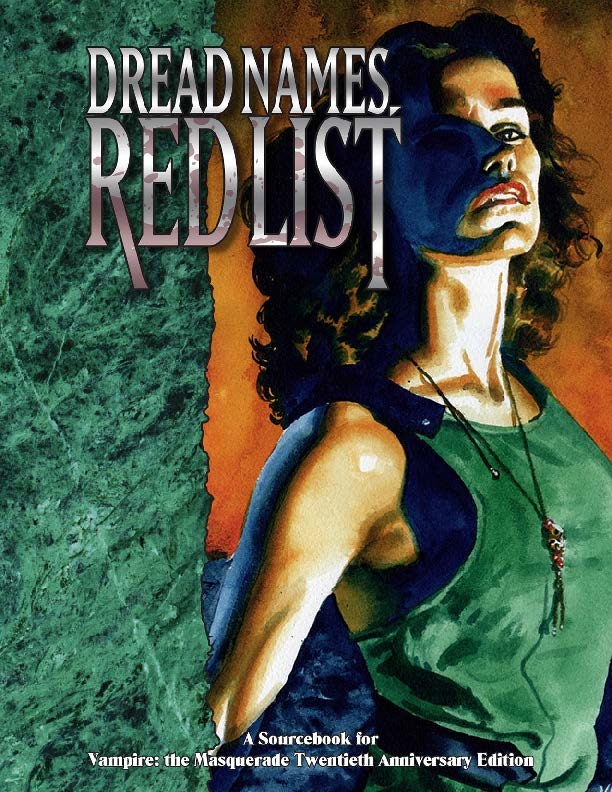 It wasn’t until last year that my first book in the V20 line came out. Developed by Matt (“the Masquerade encyclopedia”) McElroy, we initially planned Dread Names, Red List as a simple update to Kindred Most Wanted. Instead, we turned this supplement into a new way to play Vampire: The Masquerade where fans could play an Alastor and hunt down the Anathema.
It wasn’t until last year that my first book in the V20 line came out. Developed by Matt (“the Masquerade encyclopedia”) McElroy, we initially planned Dread Names, Red List as a simple update to Kindred Most Wanted. Instead, we turned this supplement into a new way to play Vampire: The Masquerade where fans could play an Alastor and hunt down the Anathema.
This June, Ghouls & Revenants debuted as well, which also offers a nuanced look at the line and an additional way to play the game. This time, instead of playing vampires, a group could play ghouls and revenants and have enough agency to tell a compelling story. Both were done with an eye to provide value to fans, while trying to add something new to Vampire within the confines of the line, since metaplot was not our primary focus.
Now, in 2016, the list of writers has grown to include more voices, more perspectives since those early days. I hope that the landscape will continue to change to be more inclusive, just like David A Hill, Jr. did for V20: Dark Ages to hire more women, to bring better representation to the line. It’s definitely something I thought about when I put together the list of writers for the upcoming V20: Dark Ages anthology, and I feel seeking out new and existing writers have made the collection stronger as a result.
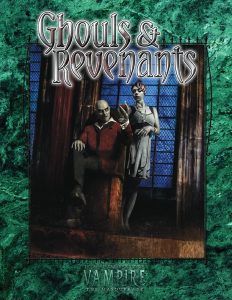 Of course, it’s always a challenge writing for a setting that is, as of this year, 25 years old–not only because a lot of material already exists, but because the fan base is much more diverse than it has been in the past. There are die hard fans, Kickstarter backers, folks who have never heard of Vampire: The Masquerade, and fans who lost touch with the property. As a result, there are several who either don’t remember or understand the cultural impact this particular game had on the vampire genre as a whole, either.
Of course, it’s always a challenge writing for a setting that is, as of this year, 25 years old–not only because a lot of material already exists, but because the fan base is much more diverse than it has been in the past. There are die hard fans, Kickstarter backers, folks who have never heard of Vampire: The Masquerade, and fans who lost touch with the property. As a result, there are several who either don’t remember or understand the cultural impact this particular game had on the vampire genre as a whole, either.
For me, the DNA of Vampire: The Masquerade can be found populated throughout novels and comics, movies and video games, songs and art and TV shows–and this is something that I think should absolutely be recognized. It isn’t always, due to the fact that the internet was not around when this phenomenon happened, but also because games have often had a stigma associated with them. Fortunately, this is beginning to erode the more authors talk about their early influences. I’m of the mind that even if a vampire-loving author isn’t consciously aware of the effects that Vampire: The Masquerade had, it still influences us in other ways because of its significance in the 90s and on so many other works.
So, I mark this anniversary with a sense of pride and gratitude for, not only have I contributed to its storied legacy in the small way that I have, I have also gotten the opportunity to watch and experience Vampire: The Masquerade‘s many iterations as both a fan and a professional. I have no idea what the future holds for the property going forward(2) or how I might intersect with what’s to come, but I am grateful for my experiences. I hope that the combination of the old and the new, the past and the present, will inspire Vampire fans for years to come. To me, that’s what matters the most.
Happy 25th Anniversary Vampire: The Masquerade!
(1) I know and have worked with Justin et al, so this is not meant to be a slam on them at all. This is more in the context of identity as opposed to anything else.
(2) Even if I did know, I couldn’t say anything more out of professional obligation.

